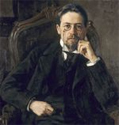________________________________________
Difficult People
WRITTEN BY:
Anton Chekhov
NARRATED BY:
Michael Scott
Difficult People is a short story written by Anton Chekhov, first published in 1886. The story revolves around a group of people in a small Russian town who are constantly arguing and bickering with each other. The main character, Yevgeny Petrovich Vysotsky, tries to maintain peace among them but finds himself becoming just as irritable and difficult as the rest of them.
The story is a satirical critique of the pettiness and small-mindedness of provincial Russian society in the late 19th century. Chekhov’s sharp observation of human behavior and his skill in depicting complex social dynamics is on full display in this story. The characters are vividly drawn, with their quirks and foibles making them both amusing and infuriating.
Difficult People is one of Chekhov’s earlier works, but it already shows the hallmarks of his style that would become so influential in the development of modern literature. His focus on the subtleties of human interaction and his ability to capture the complexities of everyday life would be a major influence on writers such as James Joyce and Virginia Woolf.
The story was well received upon its initial publication and has remained a popular example of Chekhov’s work. Its enduring relevance lies in its exploration of the universal theme of human relations, and the difficulties we face in getting along with one another.
_____________
ThoughtAudio PDF Transcript: TA0066_DifficultPeople_AntonChekhov.pdf
_____________
 Anton Chekhov
Anton Chekhov
Anton Chekhov was a Russian playwright and short story writer who had a profound impact on literature. He is widely regarded as one of the most important writers of the late 19th and early 20th centuries, and his work has influenced generations of writers around the world.
One of Chekhov’s most significant contributions to literature was his development of the modern short story. He brought a new level of realism and psychological depth to the genre, using his acute observation of human behavior to create nuanced and complex characters. His stories often dealt with the struggles of ordinary people, and his ability to capture the complexities of everyday life has been widely admired.
Chekhov’s influence on literature can be seen in the work of many writers who came after him, including James Joyce, Virginia Woolf, and Ernest Hemingway. His emphasis on understated and subtle writing, his use of everyday language, and his exploration of themes such as alienation and the human condition have been widely emulated. Chekhov’s impact on literature has been significant, and his work continues to be studied and appreciated around the world. He is considered a master of the short story and a major figure in the development of modern drama, and his influence on literature is likely to endure for many years to come.
